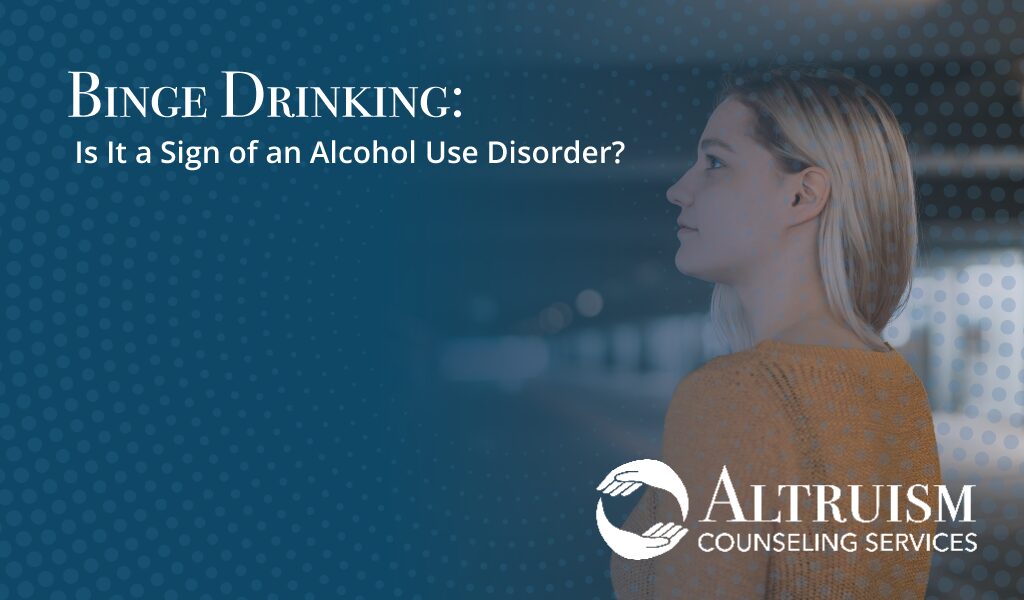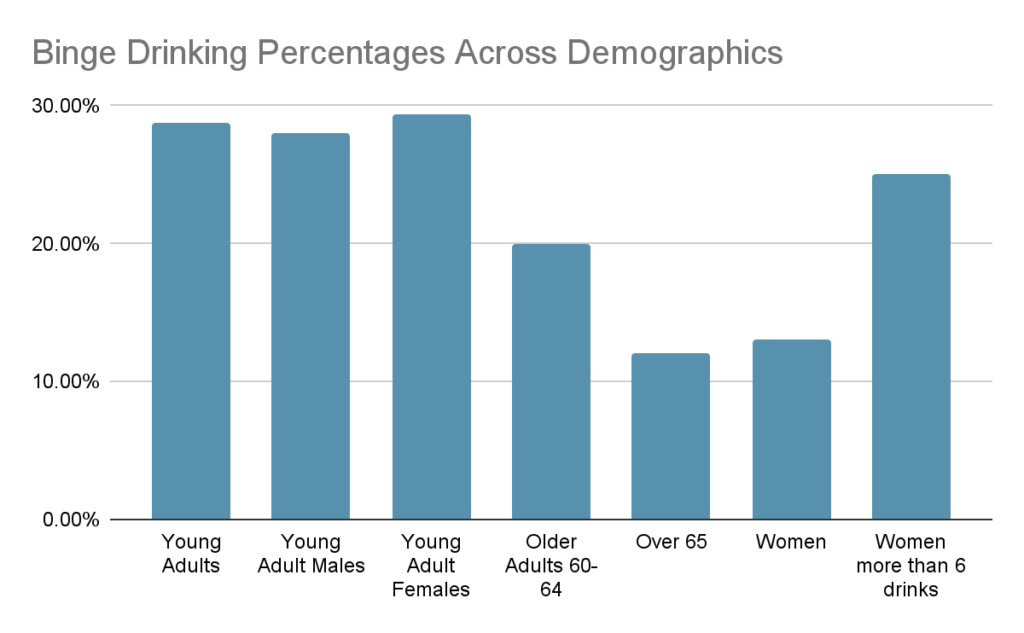
One drink. Two drinks. The next thing you know, you can’t remember how many drinks you had. You may have even forgotten the events that happened. What you participated in is known as binge drinking.
Many people in the United States binge drink. In 2022, 14% of Kentuckians participated in binge drinking. Binge drinking by itself is not an indication that someone has an alcohol use disorder, but this doesn’t mean it can’t impact you. At Altruism Counseling Services, we want to help you understand how different aspects of alcohol can impact a person. Today, we are going to discuss binge drinking and the effects that come with it.
Binge drinking is defined as ingesting enough alcohol that it raises your blood alcohol concentration (BAC) to .08% or more. For the average man, this means at least 5 drinks in a couple of hours, while the average woman is 4 drinks. Binge drinking can turn into heavy drinking if you participate in it for 5 or more days in a given month.
These drinks have specific serving sizes depending on the beverage. Standardly, this is around 14 grams of pure alcohol. For example, a serving size of 5% alcohol beer would be around 12 ounces, while a 40% distilled spirit equals 1.5 ounces.
The limit on the number of drinks is not necessarily the same for every person. Some people can safely drink more, while others can drink less, and it still qualifies as binge drinking. Several factors can contribute to how much a specific person can consume. For example, teens often require fewer drinks in 2 hours than adults to reach binge drinking levels. Also, someone who is taller or weighs more will be able to consume more alcohol than someone who is shorter or at a lower weight.
Alcohol intolerance can also be a factor in how much is considered binge drinking. In this case, a person’s body may not be able to digest alcohol, and it causes them to feel sick after 1 or 2. This factor is not reliant on their size or gender.
Binge drinking is relatively common in the United States. In 2023, 61.4 million people in the United States participated in binge drinking. This being said, some groups are more likely to engage. These include young adults, older adults, and women. Below is a chart that breaks down the percentages these demographics have:

As mentioned earlier, binge drinking is if you are drinking enough alcohol to raise your BAC to .08% in a single setting. Without a breathalyzer, how can you tell if you’ve reached this point?
One sign that you may have been binge drinking is if you can’t remember how many drinks you had or if you know that you drank more than the standard guidelines for your gender.
This isn’t the only way to know if you have recently binge drank, as it can come with many short-term side effects. Physically, you may experience an inability to concentrate, lowered inhibitions, reduced reaction times, and poor vision. Some people may experience blackouts, which is when someone loses part or all of their memory from the time they were drinking.
You may also experience concerns with your mental health after binge drinking. Many people will have a lower mood due to alcohol being a depressant, while other people have hangxiety. This is a mix of feelings of anxiety with the symptoms of a hangover.
Someone who regularly binge drinks can experience several serious side effects. Repeated binge drinking puts you at a higher risk of experiencing blackouts or alcohol poisoning each time you engage in this practice.
Binge drinking can also lead to lowered inhibitions that may result in unsafe sexual behaviors, which may lead to unintentional pregnancy or sexually transmitted infections. These lowered inhibitions may also increase the chances of potentially risky consequences such as drownings, car crashes, or falls. If you get a DUI (driving under the influence) charge after binge drinking, you may be required to attend DUI classes.
Over time, binge drinking can result in physical health concerns. This includes a decreased immune system or inflammation of the pancreas. Continued binge drinking may result in worsening liver diseases or the development of different cancers, like esophageal or liver.
Binge drinking can also result in an increased risk of alcohol poisoning. This is a medical emergency, and 911 should be called immediately. Signs of alcohol poisoning include:
If someone has any of these signs, call 911. Someone experiencing alcohol poisoning will not be able to sleep it off. Give the operator and emergency personnel all known information, including the kind and amount of alcohol. Stay with the person until first responders arrive. If possible, keep them sitting on the floor and awake. This will prevent them from choking or injuring themselves. If this is not possible, lay them on their side to help prevent choking.

Participating in binge drinking does not mean that someone has an alcohol use disorder. With that said it can be a potential sign of this condition. If someone is regularly participating in binge drinking and finds that despite setting limits for themselves, they find it challenging to stop, they might have an alcohol use disorder.
Binge drinking is not the only potential sign of an alcohol use disorder. Regular binge drinking by itself does not automatically qualify someone to have this condition. Here are the other signs you need to look out for that can indicate an alcohol use disorder:
Ultimately, the best way to prevent binge drinking is to limit drinking to no alcohol or in moderation. Moderate drinking is 2 or fewer drinks daily for men and 1 or less for women. However, for people with an alcohol use disorder, this can be easier said than done. A common experience for people with this condition is that despite setting a limit for themselves, they find it difficult to stop once they have gotten started.
Even with an alcohol use disorder, it is still possible to stop binge drinking with the help of treatment for alcoholism. Treatment can teach you the skills and tools necessary to recover from this condition. These skills are typically found in cognitive behavioral therapy (CBT). This type of therapy helps you identify harmful thoughts that might appear around binge drinking. In turn, it enables you to develop coping skills that assist you in changing those thoughts into healthier ones.

Treatment can help anyone who has concerns with binge drinking. By attending treatment, you will learn how to prevent yourself from returning to use using the principles found in Alcoholics Anonymous (AA). Your treatment plan will empower you to develop coping skills and recognize potential triggers that will allow you to live a healthier and more balanced life.
Altruism Counseling Services is located in Lexington, KY. We provide psychological assessments for mental health and substance use disorders, which allow us to derive the best treatment plan for each individual. For more information, call us at 859-310-6505.